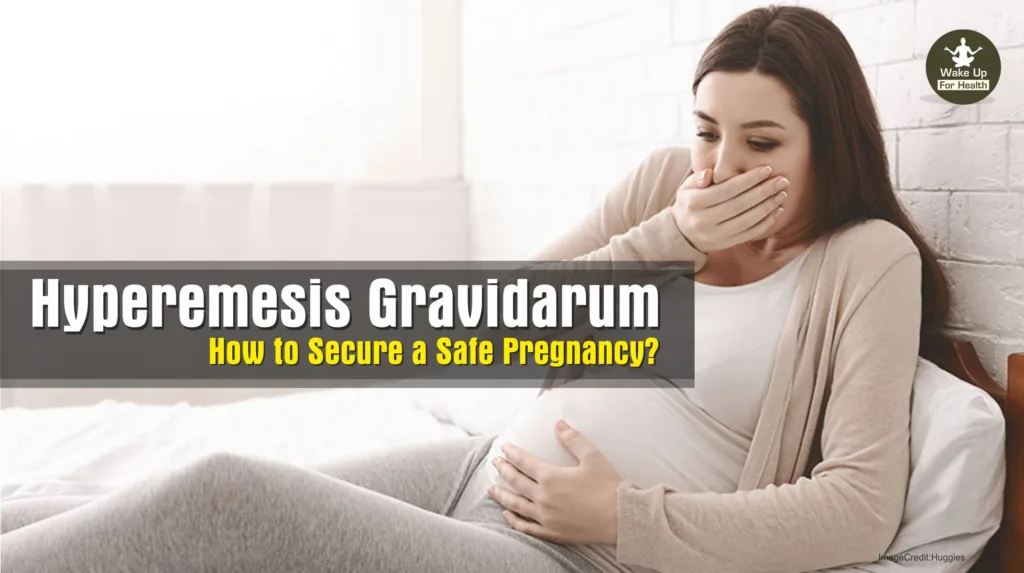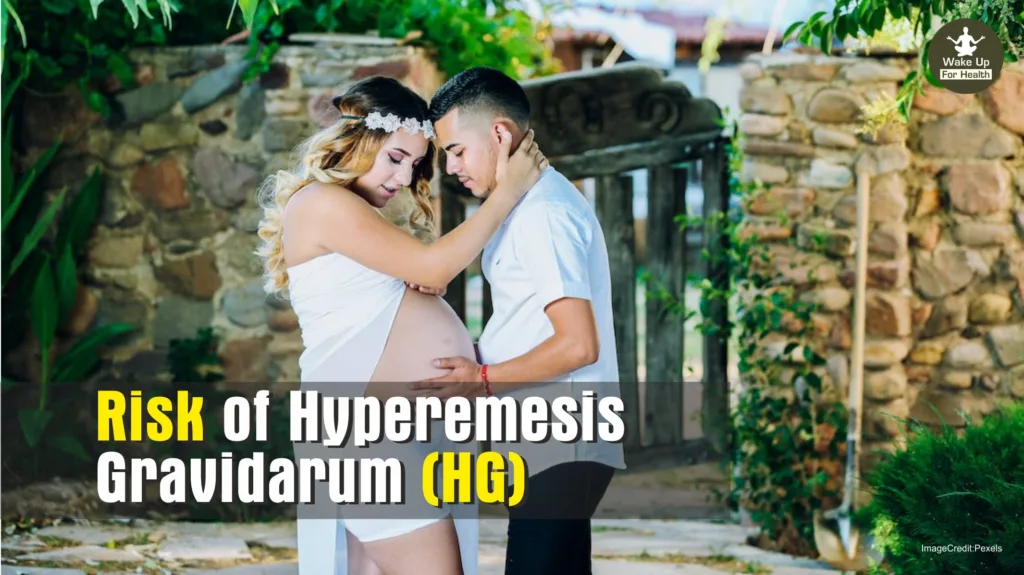Vomiting and experiencing morning sickness are common during pregnancy. This is due to the rising levels of pregnancy hormones. But as the pregnancy progresses, this problem also reduces.
Some women have to deal with excessive and severe vomiting during pregnancy. This condition is much more serious than morning sickness. This condition is called Hyperemesis Gravidarum (HG).
Let us know through this article What is hyperemesis gravidarum, hyperemesis gravidarum causes, symptoms, complication and whether its treatment is possible.

Navigating Hyperemesis Gravidarum
Rapidly rising levels of hCG Hormone along with progesterone during pregnancy can lead to excessive vomiting. When vomiting starts taking severe form, it indicates any risk of pregnancy. When a pregnant woman has continuous severe vomiting, the condition is called Hyperemesis Gravidarum.
Hyperemesis Gravidarum is not considered a common condition and affects only about 3% of women. In most of the cases, it is seen that this problem starts between 4-0 weeks of pregnancy and reduces by about 20 weeks. However, some women suffer from this condition throughout their pregnancy. If hyperemesis gravidarum is not too severe, it can be treated at home as well. But, in serious condition, there is no danger to the pregnant woman and the unborn child, so there may be a need to visit the doctor immediately.
Do you know? How Stress Attack Your Children, Have You Noticed How.
What Distinguishes Morning Sickness From Hyperemesis Gravidarum (HG)?, Symptom Management, Treatment Options
Morning sickness is usually characterized by nausea, which is sometimes accompanied by vomiting (vomiting in pregnancy). Almost all women experience morning sickness to some degree during their pregnancy. Morning sickness during pregnancy is called nausea and vomiting. Most of the vomiting that occurs with morning sickness does not cause severe dehydration.
Despite the name, morning sickness is not limited to the morning. This can happen at any time. It usually heals after 42 to 44 weeks. Morning sickness usually starts in the first month of pregnancy and ends by the third or fourth month.
Pregnant women with morning sickness may experience fatigue and loss of appetite. They may also find it difficult to carry out their normal activities. Hyperemesis gravidarum, on the other hand, is an uncommon disorder characterized by excessive and persistent nausea and vomiting during pregnancy.
In this condition, severe vomiting occurs due to excessive vomiting, due to which the pregnant woman has difficulty in eating and drinking, which causes fatigue and weakness. According to the Hyperemesis Education and Research Foundation, women who experience hyperemesis gravidarum during pregnancy may experience a complete loss of appetite. They may not even be able to work or do daily activities.
Symptoms of hyperemesis gravidarum are excessive vomiting or vomiting of blood in pregnancy, loss of appetite and weight loss in pregnancy. Although the symptoms of morning sickness are somewhat similar, the condition is not as severe as the body does not reduce or eliminate the urge to eat. But, with hyperemesis gravidarum, even taking a bite of food can be difficult.

What are the Causes of Hyperemesis Gravidarum (HG)?
Vomiting in pregnancy is caused by the rising levels of hormones, such as human chorionic gonadotropin, estrogen and progesterone, in early pregnancy. While it is normal to have some amount of vomiting during the first trimester of pregnancy, excessive vomiting can become a cause of discomfort.
Hydatidiform mole is also a cause of hyperemesis gravidarum. Where an abnormal fertilized egg develops into a hydatidiform mole instead of an embryo. In some cases, the condition of hyperemesis gravidarum can also arise in pregnant women due to the deterioration of the process of the digestive system, but this is very rare. However, the main cause of hyperemesis gravidarum is thought to be hormonal changes.
Have you seen? Simple Ways to Live a Happy Life. Happiness All Around.
What are the Symptoms of Hyperemesis Gravidarum (HG)?
Morning sickness can cause loss of appetite, nausea or vomiting can bother you a bit. It differs from hyperemesis because women are usually able to eat and drink during morning sickness. In such a situation, it is necessary to be aware of the symptoms of Hyperemesis Gravidarum so that by identifying them in time, you can get treatment from the doctor.
The most common symptoms of hyperemesis gravidarum include:
- Severe nausea and vomiting
- Loss of appetite
- Vomiting of blood in pregnancy
- Suffering from depression
- Vomiting three to four or more times per day
- Weight loss due to excessive vomiting
- Weakness
- Dizziness in pregnancy
- No desire to pass urine
- Ketosis (॥(9(055)) – a serious condition when the amount of ketones (a toxic chemical) in the blood and urine increases due to excessive vomiting. Not all pregnant women experience these symptoms.
In some cases, morning sickness can be severe and may require hospitalization.
What is the Risk of Hyperemesis Gravidarum (HG)?
There are certain factors that can cause excessive vomiting in women during pregnancy or vomiting of blood in pregnancy.
Let us know about some factors, which can increase the risk of hyperemesis gravidarum.
The following factors raise the risk of hyperemesis during pregnancy:
- Have a family history of hyperemesis gravidarum
- Having more than one fetus in the womb
- Being overweight
- First time mother
- Trophoblastic diseases can also cause hyperemesis gravidarum. Trophoblastic disease occurs when Abnormal growth of cells inside the uterus.
How to Diagnose Hyperemesis Gravidarum (HG)?
To diagnose hyperemesis gravidarum, your doctor will ask about your symptoms along with your medical history. Physical examination is sufficient to diagnose hyperemesis gravidarum. Your doctor will look for the most common symptoms of hyperemesis gravidarum, such as low blood pressure or a high pulse rate.

Blood and urine samples may be taken to check for signs of dehydration. At the same time, some additional tests can be advised to detect gastrointestinal problems as this also causes nausea and vomiting. Whereas a pregnancy ultrasound will be done to see if there is one fetus or more in the womb. Ultrasound checks for hydatidiform moles, which may be the cause of hyperemesis gravidarum.
What is the Treatment for Hyperemesis Gravidarum (HG).
Treatment for hyperemesis gravidarum depends on the severity of a pregnant woman’s symptoms. Your doctor may recommend natural ways to prevent nausea, such as consuming vitamin B-6. Nausea and vomiting can also be treated by eating dry foods.
Your doctor may advise you to drink plenty of fluids to stay hydrated. Severe cases of hyperemesis gravidarum may require hospitalization. Pregnant women who are unable to drink water or eat food due to persistent nausea or vomiting are given food intravenously or through an IV. When vomiting threatens the woman or the child, it is necessary to give medicine.
However, once hyperemesis gravidarum is confirmed and the doctor prescribes the anti-nausea drugs promethazine and meclizine. You can take these drugs either through an IV or as a suppository. Taking the drug while pregnant can cause potential health problems for the baby, but in severe cases of hyperemesis gravidarum, dehydration in the mother is a problem. So talk to your doctor about the risks associated with either method of treatment.
Must Read : Really, Digital Detoxing is Necessary to Survive a Healthy Life.
What are the Complications of Hyperemesis Gravidarum (HG) ?
If hyperemesis gravidarum is treated on time, you may not have any complications associated with it. However, if the disease is very severe, you may have a blood clot in a vein. This is called deep vein thrombosis. This happens when there is a lack of water in your body or there is a decrease in your movement.
You will then be given a medicine called heparin to reduce the risk of blood clots. Along with this, the doctor can also advise you a special compression stockings. These are often used to prevent blood clots. It might also lead to difficulties if your body is deficient in vitamins. Vitamin B6 deficiency in your body can cause you to experience pain as well as tingling sensations in your hands and feet.

What is the Right Time to Visit Doctor?
You should consult your doctor immediately as soon as you notice any symptoms of Hyperemesis Gravidarum. Difficulty in drinking water or juice can lead to dehydration in the body, due to which complications can arise. In this case, you should see the doctor soon.
Hyperemesis Gravidarum is not a common condition associated with pregnancy and hence visiting a doctor early will help you avoid further complications.
(Disclaimer : The purpose of this health-related article is to wake you up and aware of your health and to provide health-related information. Your doctor has a better understanding of your health and there is no substitute for their advice.)